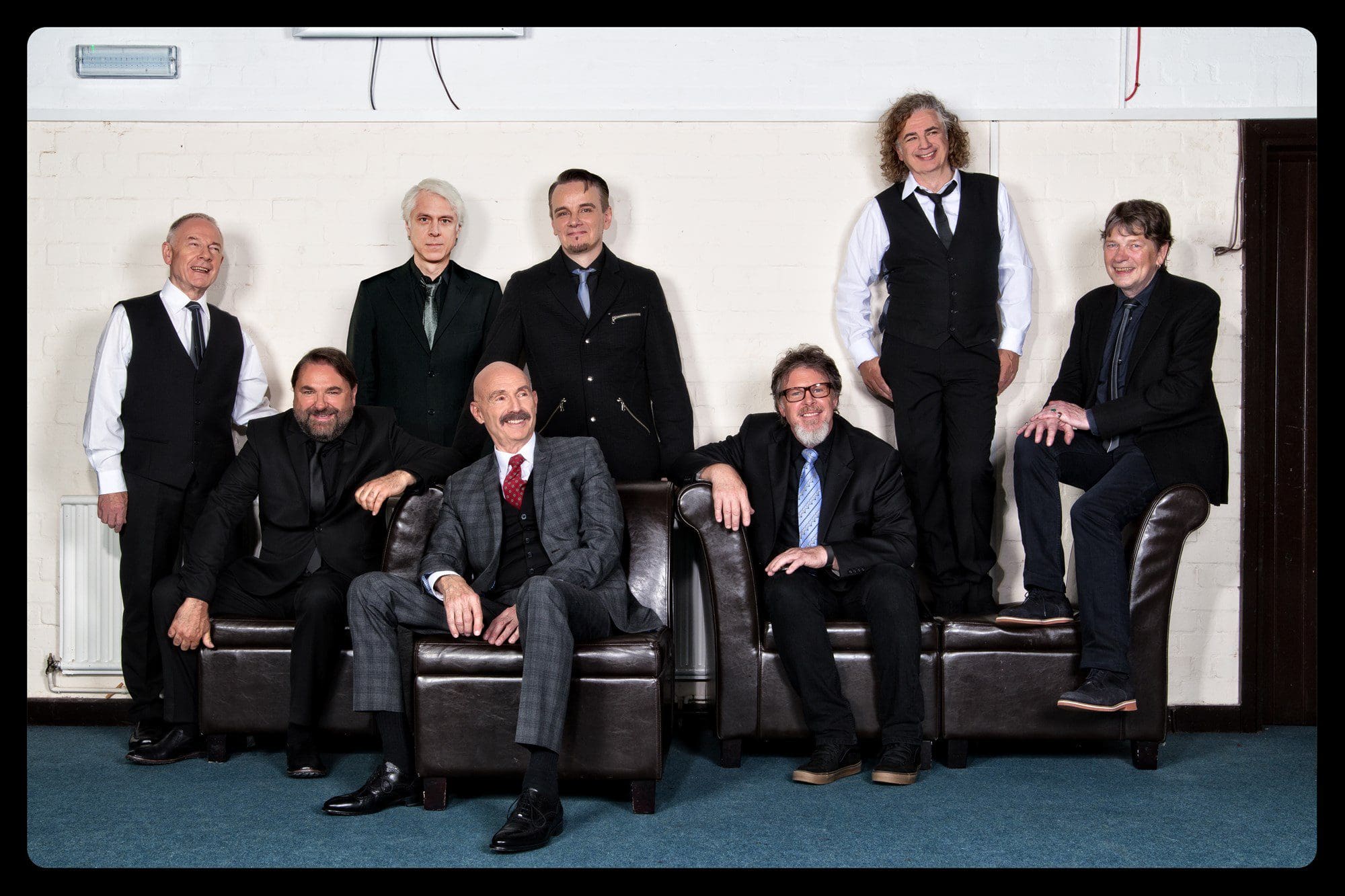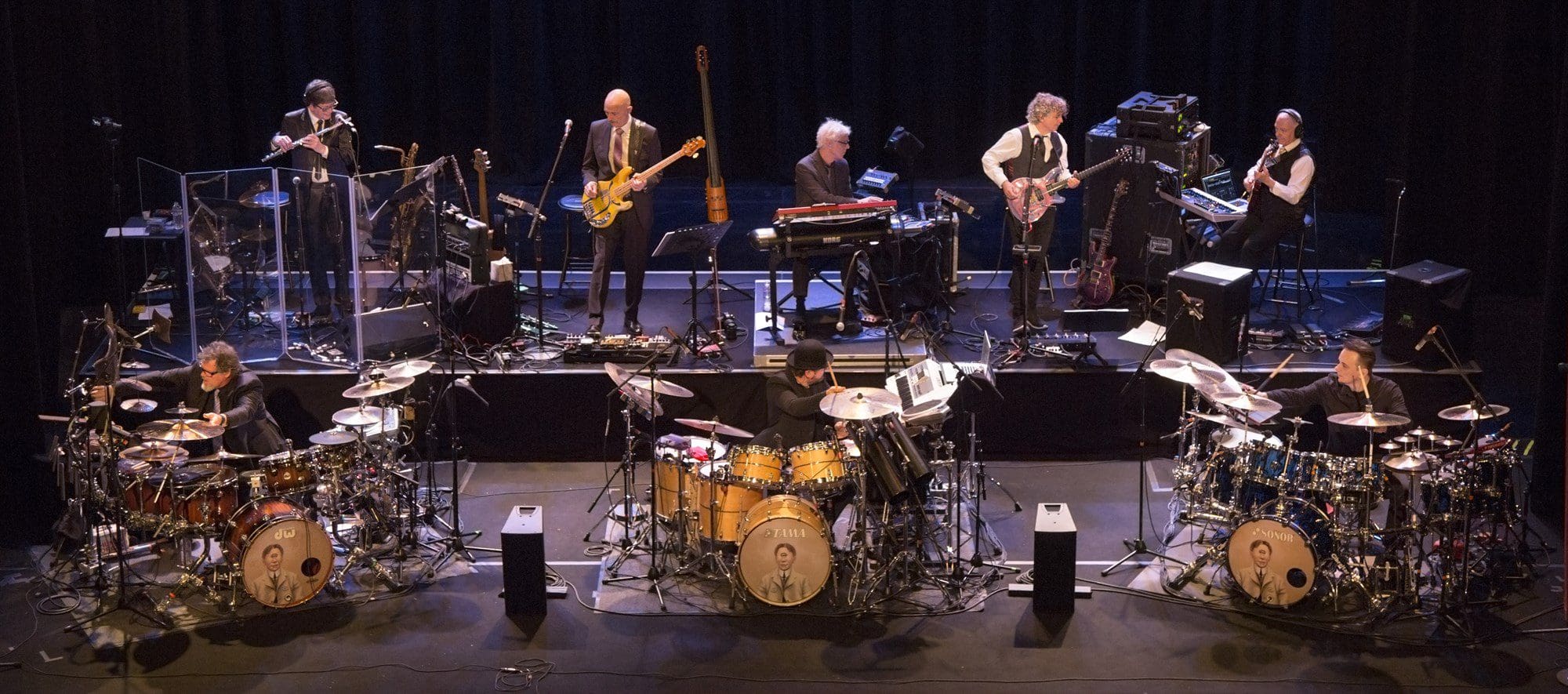
King Crimson needs no true introduction; with a long and storied history in paving the way for progressive rock, from their groundbreaking debut album to the present day, Robert Fripp and his rotating ensemble of world-class musicians have been at the forefront of unique and captivating sonic exploration. As they gear up for another tour of the U.S., in yet another formation (double quartet this time around), bassist Tony Levin took some time out of his day to answer a few of my questions about the group, his place in it, rock history, and more.
First off, Levin seemed almost giddy at the prospect of hitting the road again. As mentioned earlier, King Crimson has been reaching in different musical directions for almost 50 years, and 2017 sees the band reinventing themselves again. As Levin explains, “This incarnation with eight players now in King Crimson, it’s very different from when I joined in 1981 when there were four players. It’s always challenging, it’s always fun to play the King Crimson repertoire, both the older pieces and the newer ones, and it’s a band that musicians love to be in, and having been a player for a long time, I love the challenge and fun of being in it. It’s a great experience for me, very lucky and very happy to still keep doing it after all these years.”
As Levin alluded to, the King Crimson repertoire is vast and far-reaching, including quite a bit of material from the period before Levin joined. When asked about the significance of learning those pieces, Levin was characteristically humble, saying, “We do a lot of material from before I joined the band, in fact a huge amount. It was a big challenge, all of it, but the challenge wasn’t technically playing the part correctly. The challenge was that some of these bass parts are iconic, fantastic, and by other bass players. I want to keep what’s special about those parts, I wouldn’t dream of losing that. But also, a priority to me is to be myself and put myself into the part as much as the music can handle. I don’t want to ruin it by taking away something great.”

This question drew quite the response, as Levin explained his process for putting his own spin on a well-known tune: “We rehearse a lot, weeks before each tour. I use that rehearsal time to work out how much of each part should I keep, and what sonic changes are needed. For instance, the Chapman Stick I play sometimes instead of bass, that will make me feel like I’m owning the part a bit, but keeping it true to what it was. So that’s the challenge for me with the older pieces. And to tell you the truth, recently we’ve done some of the older pieces where I placed the original, like ‘Discipline’, and I remember when we started it that that was a work in progress for me, and indeed I am still working on improving my own part that I wrote back in the 80s.”
In addition to his work with King Crimson, Levin has appeared on hundreds of records as a studio session musician. I wondered if playing with so many musicians affected the way he approached his own songwriting or his work with King Crimson. As he puts it, “In this case I can speak for the whole band. I would put it [approaching music] not necessarily as breaking new ground, but it is truly a progressive band. We’re not trying to do what we did before. We do that as a band but also as individuals with our playing. So we’re always trying to find a new sound with the band, and I’m always trying to find a new bass sound, maybe picking up a new instrument, always tweaking the things that came before, trying to break new boundaries. This is my research and development period, especially during rehearsals, when I break new boundaries for myself, and I would not be happy in this band, nor would the band be happy with me if I did it the way I did in 1981, because that is just not what King Crimson is about.”
When I asked if there was a musician he had never played with but would like to, he answered like so many artists before him: “Can I pick Jimi Hendrix? That would be my first choice.” After a good laugh, he did have another interesting take on it, one which I didn’t expect from someone of Levin’s musical stature: “When I hear something good on the radio, part of me is listening to it and seeing what they did, and another part of me wishes I played it. In a way I want to play on everything that’s good. I love playing good music. Of course when I hear a great band, I simultaneously am a fan of music and also wish I was playing the bass part.”
Musicians like Tony Levin have been in the game for a while. They’ve seen greats come and go, they’ve seen the flashes in the pan. Almost everything has changed in the music scene in the last 30 years, but Levin had some thoughtful words about the state of rock and roll: “I’m a very happy guy because I’ve just been able to play good music for a career and I look forward to more of it. Everything else has changed. Clubs have changed, and if you start a rock band, you can’t play clubs the way you used to. My trio is lean and compact, and yet the way we play clubs has changed through the years; we can’t play the circuit we used to. We play smaller clubs and it’s still worthwhile and we love doing it, but it’s changed. I think we all try to keep reminding ourselves that the real reward is to get to play music and those of us who get to are very lucky indeed.”

However, there was encouragement in his words as well: “The only thing that hasn’t changed is the core, the reason to be a musician. Not all musicians, but most of the players that I know, we went into it because we love music and wanted to play, and we’re going play it no matter what. We sailed the rough seas of the music business, which is always changing, and tried to find a way either as a band or solo act or side man. I’ve been all three. The attempt to play music and the reward is there.”
On the subject of music being rough and constantly changing, the trend of musical figures passing on only seems to be picking up the pace. However, King Crimson and Tony Levin will keep shredding minds as long as the muse permits, albeit with some variables, as Levin explains: “I can answer a bit, but I never really know [the future of King Crimson]. Robert Fripp is our leader, and everything about King Crimson lies in his designs,” he says of the mythical and reclusive bandleader. He continues, “I am often surprised by his musical decisions, and I am always pleased and excited to try and implement them. So in a sense I don’t know what is going on at all, but next year we’ve already filled up for touring, and we’re actually already looking at 2019.” So fans of King Crimson, strap in for at least two more years!
With the group’s reputation for methodical precision running into multi-night runs in some cities on tour, I was curious about how a King Crimson tour comes together in terms of set lists, improvisation, etc. Levin delved into the sheer breadth of maintaining this sort of performance act:
“We are very precise in a way, but there is a lot of improvisation within the set, and there are some sets we do that are completely improvised. As far as the set, we have far more material than we can do in one show, and we do three-hour shows. We do a lot of material and we have a lot more than that, and we do change some of it from night to night. I would say we never play the same two shows night after night; especially if we’re do two nights in the same place, we change it up for people who are there for both shows. We don’t know the first set list for a show until the day before. We will work up a lot of material, pick some, and change away. Robert Fripp goes to breakfast every morning and thinks up a set list for that night, he emails it to us usually by noon, and if anyone has any particular technical problems, those might get changed around in the afternoon. By three or four we’re at the venue anyway, sound checking and addressing issues there may be.”
Revisiting the issue of King Crimson’s future, Levin continued, stating: “We will keep playing on the road, for many months of the year. I am sure we will continue to re-explore some of the old catalogue. King Crimson has been around a long time, and some of that music hasn’t been played since the ‘60s. Some of it has never been played live, and we’re looking at those and trying to approach those as though they were new pieces, and we do come up with new material from each tour. So there is enough to do a new studio album, but I haven’t heard any plans to do that.” A new King Crimson studio album would be earth-shattering indeed.
King Crimson has been one of the preeminent voices in progressive rock for almost half a century, and they’ve earned their place among the rock n’ roll greats. The talent on display in any combination of members is staggering, and under Robert Fripp’s guidance the band continues to turn heads and inspire artists to this day. Tony Levin’s contributions have been legendary and speak for themselves, with more than a few surprises still sure to be unearthed. An absolute bucket-list must-see experience, don’t miss King Crimson if they’re near you in the future.

